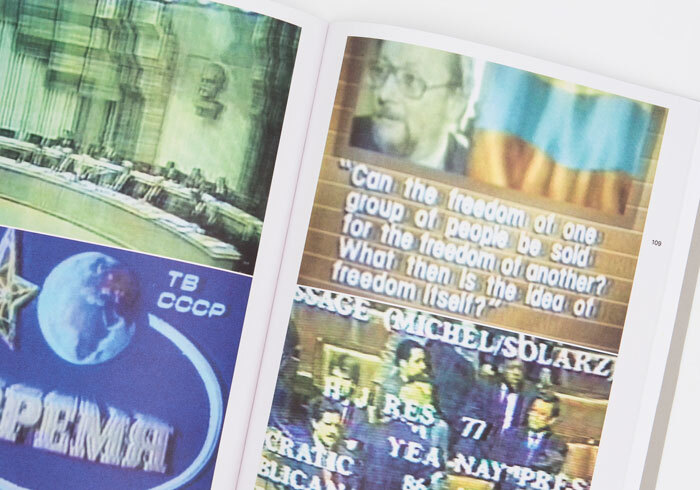Oliver Basciano presents a guide to new and upcoming books on collapse, implosion and the little white dress
In 1989 Jonas Mekas was sitting in his studio apartment on Broadway in New York, watching the beginning of the end of the Soviet Union. He started to film the TV screen as footage of Mikhail Gorbachev and George Bush flickered across it; zoomed in on appearances of Kazimira Prunskiene, the future prime minister of the soon-to-be-independent Lithuania, the country from which Mekas emigrated in 1949; and continued to record the television on and off for two years as pundits and talking heads on nightly news shows had their say. The result, a documentation of the documentation of the USSR’s slow implosion, became Lithuania and the Collapse of the USSR (2009), a video that clocks in at just under five hours. Now part of it is a book – Transcript 04 44’ 14”: Lithuania and the Collapse of the USSR (Humboldt Books, €30) – in which the mediated media is mediated once more. For all that the video and book document a moment of political history, both also serve as a self-portrait of an immigrant, his birth country filtered through the perspective of his adopted home. Made up of transcripts of those newscasts and grainy stills from Mekas’s original video, it’s a book that shouldn’t really work but proves strangely moving as one sees the mediation of history unfolding in real time.
Taking issues of change up a notch, the slow, unbearable end of the world is the subject of How Everything Can Collapse, by agronomist Pablo Servigne and eco-adviser Raphaël Stevens (Polity, £14.99). The book charts an imminent, unmanageable decline in the world’s environment and social systems, and though it was of course written before the COVID-19 pandemic, this kind of catastrophe is now dreadfully relatable in the way the slow-burn of climate change, however dangerous, has never managed to be. The pair point out, however, that from outside an anthropocentric perspective, such decline might not be a negative: without the invasive species Homo sapiens, the world will prosper (recent viral videos showing the clarity of the Venetian waters absent the usual boat traffic perhaps attest to something similar). Though this may, for our species, be of little comfort in the current circumstances. Starved of physical human contact and being forced to mediate the world through the screen in these days of isolation, perhaps the work of Doug Wheeler – a pioneer of the American ‘Light and Space’ movement, whose artmaking reflects his interests in dematerialisation, landscape and the emptying out of human presence – is similarly one of the last things you want to read about. Stick with it, though, because as art historian Germano Celant notes in this new monograph (David Zwirner Books, $75), there exists in Wheeler’s paintings and light installations a ‘phenomenological collapse of materials’ that is as relevant now as it was during the 1970s.
Amateur Photography. From Bauhaus to Instagram (Kehrer Verlag, €29.90), a self-explanatory catalogue to a recent exhibition at the Museum für Kunst und Gewerbe, Hamburg, charts the work of lay witnesses to history, which has come into its own in a world awash with disposable digital imagery. It’s funny how much curator Esther Ruelfs’s description of Bauhaus photography in her essay here (‘an experimental approach in which the camera is tilted upwards or downwards, tonal values are distorted, or objects are shot in extreme close-up or in exerted details only – all stylistic means that emulate the casual snapshooter’) chimes with the photographs in ArtReview contributor Jeppe Ugelvig’s new book on fashion and art, Fashion Work (Damiani, €40). The cover of the latter shows an extreme close-up of a man’s perfect smile, while the documentation of work by Bernadette Corporation, Susan Cianciolo, BLESS and DIS continues the same sense of effortless cool. What unites these four outfits, says Ugelvig, is how they’ve made art not just relating to fashion, but from an ‘embedded’ position within the fashion industry.
Clothes say a lot about us, both as a society and as individuals. (Whether we will see out the Anthropocene in rags or Saint Laurent remains to be decided.) Such is the basis of a memoir by Alexandra Shulman, Clothes… and other things that matter (Octopus Books, £16.99), in which the former editor of British Vogue traces her life and the place of women in Western society through fashions, ill-advised or otherwise. The idea that an item of clothing comes with emotional baggage is demonstrated, meanwhile, through the tragic story of Pippa Bacca, recounted by Nathalie Léger in The White Dress (Les Fugitives, £12), a work of autofiction new in translation. Bacca, an Italian artist, was murdered in 2008, having set out on a performative hitchhike through Europe wearing a white wedding dress, an act she hoped would symbolise the ‘marriage between different peoples and nations’.
Perhaps this hasn’t been the cheeriest 900 words you’ve ever read, so ArtReview feels like finishing with something beautiful. Paper Bells (The Song Cave, $17.95), a collection of newly translated work into English by Vietnamese poet Phan Nhiên Hạo, is full of admittedly melancholic but sometimes humorous diaristic observations on the minutiae of everyday life: the weather, making ends meet, the evening news. In ‘Rainy Day Song’, from 1989, there are some lines that feel, at least in this moment, like a paean to humanity. ‘It rains morning to night / I still have enough to survive a hundred more years / so I’ll just lie down and sing / man’s forever song’.
From the April 2020 issue of ArtReview
